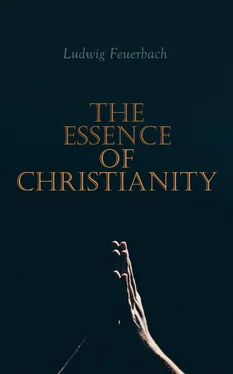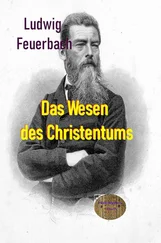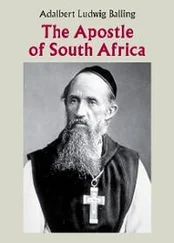But if, notwithstanding, thou wilt posit an object of feeling, but at the same time seekest to express thy feeling truly, without introducing by thy reflection any foreign element, what remains to thee but to distinguish between thy individual feeling and the general nature of feeling;—to separate the universal in feeling from the disturbing, adulterating influences with which feeling is bound up in thee, under thy individual conditions? Hence what thou canst alone contemplate, declare to be the infinite, and define as its essence, is merely the nature of feeling. Thou hast thus no other definition of God than this: God is pure, unlimited, free Feeling. Every other God, whom thou supposest, is a God thrust upon thy feeling from without. Feeling is atheistic in the sense of the orthodox belief, which attaches religion to an external object; it denies an objective God—it is itself God. In this point of view only the negation of feeling is the negation of God. Thou art simply too cowardly or too narrow to confess in words what thy feeling tacitly affirms. Fettered by outward considerations, still in bondage to vulgar empiricism, incapable of comprehending the spiritual grandeur of feeling, thou art terrified before the religious atheism of thy heart. By this fear thou destroyest the unity of thy feeling with itself, in imagining to thyself an objective being distinct from thy feeling, and thus necessarily sinking back into the old questions and doubts—is there a God or not?—questions and doubts which vanish, nay, are impossible, where feeling is defined as the essence of religion. Feeling is thy own inward power, but at the same time a power distinct from thee, and independent of thee; it is in thee, above thee; it is itself that which constitutes the objective in thee—thy own being which impresses thee as another being; in short, thy God. How wilt thou, then, distinguish from this objective being within thee another objective being? How wilt thou get beyond thy feeling?
But feeling has here been adduced only as an example. It is the same with every other power, faculty, potentiality, reality, activity—the name is indifferent—which is defined as the essential organ of any object. Whatever is a subjective expression of a nature is simultaneously also its objective expression. Man cannot get beyond his true nature. He may indeed by means of the imagination conceive individuals of another so-called higher kind, but he can never get loose from his species, his nature; the conditions of being, the positive final predicates which he gives to these other individuals, are always determinations or qualities drawn from his own nature—qualities in which he in truth only images and projects himself. There may certainly be thinking beings besides men on the other planets of our solar system. But by the supposition of such beings we do not change our standing point—we extend our conceptions quantitatively not qualitatively . For as surely as on the other planets there are the same laws of motion, so surely are there the same laws of perception and thought as here. In fact, we people the other planets, not that we may place there different beings from ourselves, but more beings of our own or of a similar nature. 6
§ 2. The Essence of Religion Considered Generally.
What we have hitherto been maintaining generally, even with regard to sensational impressions, of the relation between subject and object, applies especially to the relation between the subject and the religious object.
In the perceptions of the senses consciousness of the object is distinguishable from consciousness of self; but in religion, consciousness of the object and self-consciousness coincide. The object of the senses is out of man, the religious object is within him, and therefore as little forsakes him as his self-consciousness or his conscience; it is the intimate, the closest object. “God,” says Augustine, for example, “is nearer, more related to us, and therefore more easily known by us, than sensible, corporeal things.” 7The object of the senses is in itself indifferent—independent of the disposition or of the judgment; but the object of religion is a selected object; the most excellent, the first, the supreme being; it essentially presupposes a critical judgment, a discrimination between the divine and the non-divine, between that which is worthy of adoration and that which is not worthy. 8And here may be applied, without any limitation, the proposition: the object of any subject is nothing else than the subject’s own nature taken objectively. Such as are a man’s thoughts and dispositions, such is his God; so much worth as a man has, so much and no more has his God. Consciousness of God is self-consciousness, knowledge of God is self-knowledge. By his God thou knowest the man, and by the man his God; the two are identical. Whatever is God to a man, that is his heart and soul; and conversely, God is the manifested inward nature, the expressed self of a man,—religion the solemn unveiling of a man’s hidden treasures, the revelation of his intimate thoughts, the open confession of his love-secrets.
But when religion—consciousness of God—is designated as the self-consciousness of man, this is not to be understood as affirming that the religious man is directly aware of this identity; for, on the contrary, ignorance of it is fundamental to the peculiar nature of religion. To preclude this misconception, it is better to say, religion is man’s earliest and also indirect form of self-knowledge. Hence, religion everywhere precedes philosophy, as in the history of the race, so also in that of the individual. Man first of all sees his nature as if out of himself, before he finds it in himself. His own nature is in the first instance contemplated by him as that of another being. Religion is the childlike condition of humanity; but the child sees his nature—man—out of himself; in childhood a man is an object to himself, under the form of another man. Hence the historical progress of religion consists in this: that what by an earlier religion was regarded as objective, is now recognised as subjective; that is, what was formerly contemplated and worshipped as God is now perceived to be something human . What was at first religion becomes at a later period idolatry; man is seen to have adored his own nature. Man has given objectivity to himself, but has not recognised the object as his own nature: a later religion takes this forward step; every advance in religion is therefore a deeper self-knowledge. But every particular religion, while it pronounces its predecessors idolatrous, excepts itself—and necessarily so, otherwise it would no longer be religion—from the fate, the common nature of all religions: it imputes only to other religions what is the fault, if fault it be, of religion in general. Because it has a different object, a different tenor, because it has transcended the ideas of preceding religions, it erroneously supposes itself exalted above the necessary eternal laws which constitute the essence of religion—it fancies its object, its ideas, to be superhuman. But the essence of religion, thus hidden from the religious, is evident to the thinker, by whom religion is viewed objectively, which it cannot be by its votaries. And it is our task to show that the antithesis of divine and human is altogether illusory, that it is nothing else than the antithesis between the human nature in general and the human individual; that, consequently, the object and contents of the Christian religion are altogether human.
Religion, at least the Christian, is the relation of man to himself, or more correctly to his own nature ( i.e. , his subjective nature); 9but a relation to it, viewed as a nature apart from his own. The divine being is nothing else than the human being, or, rather, the human nature purified, freed from the limits of the individual man, made objective— i.e. , contemplated and revered as another, a distinct being. All the attributes of the divine nature are, therefore, attributes of the human nature. 10
Читать дальше












